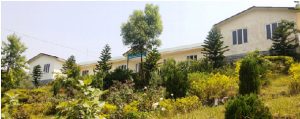|
Arabic is a living language of the world. Its literary heritage is rich. From time immemorial of its history it has never failed in fulfilling the demands of changing world. There are several Arab literary figures whose works are counted as world classics. In 1988, it was a feat for Arabic language and literature when Nageeb Mahfuz was awarded Nobel Prize for his contribution to the field of Arabic novel. Besides, Arabic is the official language of 18 Arab countries, fourth language of the world and sixth language of UNO. The oil boom in 1920 converted the Arabian Desert into a golden hen. It became a haven for people from all over the world looking for earning quick buck. People from all over the world including India turned to Arab countries for employment that was facilitated by their knowledge of Arabic language. Keeping in view
this huge potential of the language, the University started the Department of Arabic when it came into existence in 2005.
|

Department of Arabic |
|
|
The Department of Arabic was established with the introduction of the M.A. Arabic programme in 2005, followed by the B.A. (Hons) Arabic in 2010, Ph.D. programmes in 2010 and M Phil programme in 2011. Currently, the Department offers the Four-Year Undergraduate Programme (FYUP) B.A. (Hons) Arabic under NEP 2020, along with M.A. Arabic and Ph.D. programmes.
Over the years, hundreds of students have been awarded undergraduate and postgraduate degrees, while more than fifty scholars have successfully earned M.Phil. and Ph.D. degrees from the Department. Mr. Anayatullah Khan and Dr. Musarrat hold the distinction of being the first scholars to be awarded the M.Phil. and Ph.D. degrees, respectively. Later on the MA Urdu , MA Islamic Studies, and Persian programems were introduced in 2017 and 2021 respectively under the aegis of the Department. Dr. Shams Kamal Anjum has served as the first Head of the Department of Arabic since December 9, 2009. He is also the founding Coordinator and Head of the Urdu, Islamic Studies, and Persian programmes/departments.
The Department has consistently progressed over the years. In addition to regular academic teaching, it has actively organized a number of literary and academic activities, including seminars, workshops, extension lectures, and symposia. Almost all the senior professors of Arabic from reputed universities across the country—and some from Arab nations—have visited the Department and delivered extension lectures. Notably, Department had the privilege of initiating a lecture series in 2016 in the name of Hazrat Baba Ghulam Shah Badshah. Since then, several lectures have been successfully organized under the banner of the Baba Ghulam Shah Badshah Lecture Series.
|
|